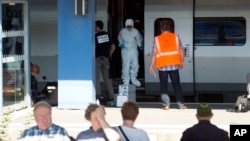Europe's rail system is at the heart of its open borders, a way for passengers to travel on some of the world's fastest and most sophisticated mass transit with no need for passports or even ID.
The man who attacked a high speed train last week paid in cash, allowing him to avoid identifying himself, and boarded in Brussels, the EU capital, and carried a small arsenal of weapons in his bag. The thwarted attack raised pressure to increase security in the 26 countries that allow travel without border checks.
The EU has ruled out tightening controls at the frontiers, leaving individual governments — and the train companies themselves — to resolve an international security challenge they say isn't limited to mass transit, even if the railways are an acknowledged target.
The attack Aug. 21 on the Thalys train from Amsterdam to Paris happened at the height of the summer travel season, when the cars were packed with tourists, including the three American friends — two in the military — who tackled and ultimately subdued the gunman.
The attacker, identified as Ayoub El-Khazzani, selected the train, refusing a ticket for an earlier connection. He had been flagged for links to radical Islamists by Spain, and German officials tracked him flying from Berlin to Istanbul in May.
Trains in Europe have been targeted for terrorist attack before, notably in London and Madrid. And Europe is not alone in its vulnerability. Train networks in Japan and the United States operate similarly. The Eurostar connecting Britain to Brussels and Paris requires a passport and luggage checks, and China has X-ray checks on subways.
But the latest attack has left authorities puzzling over how to boost security without causing transport gridlock, imposing exorbitant costs security services, or unpicking the painstakingly drawn up agreement that allows passport-free travel.
"It is better to concentrate on concrete measures that we can put into place easily and that will actually improve security,'' said Nathalie Goulet, a French senator who is a member of a commission investigating jihadi networks. "I have a hope for logical measures, not in extravagant things.''
Emergency meeting
France hosts emergency talks in Paris on Saturday, with representatives from other high-speed international rail nations — Belgium, Britain, Germany, Italy, Luxembourg, the Netherlands, Spain and Switzerland, as well as the European Union's top transport and interior affairs officials.
"The Thalys is a train that covers four countries. This has to be dealt with on a European level,'' Guillaume Pepy, the CEO of France's SNCF rail network, told the BFM television network this week.
Without open borders, rail services could not compete with low-cost air travel. Indeed any security measure that might stop people easily hopping on an international train downtown could be the system's undoing.
The European Union believes there's no need to change the agreement, known as Schengen, which ensures free movement of goods, services and business.
National police and rail companies are free to screen and check passenger bags as much as they want and even to check people's ID, which citizens are obliged to carry in Europe. What they can't do is scan that ID to a database — be it customs or criminal — because this would constitute a border check.
Tighter security recommended
Come Saturday, the EU will press for the increased use of closed circuit cameras in trains and stations, and more metal detectors at entrances.
The European Commission will raise the idea of using full-body scanners for people who try to board at the last minute. Another idea is the more concerted use of passenger information, which some companies already collect, the way that traveler data is collected for security purposes in air transport.
Plain-clothes "rail marshals'' are another possibility. Staff working on trains could be trained to handle weapons, for example. The idea is to create psychological comfort, by reassuring travelers and leaving potential criminals wondering whether armed personnel are aboard.
What is clear is that there is no time to introduce new EU rules on rail security or changes to international agreements. Europe's trains can travel at more than 200 miles per hour; political change moves more slowly.
Saturday's talks could lead to a code of conduct, according to EU officials, which might increase pressure on the rail industry to improve standards.
The results of the meeting will be debated by Europe's rail security working group on Sept. 11, and forwarded for EU transport ministers to discuss when they meet on October 7-8.
Any decision won't come cheap, with the burden of ensuring the safety of thousands of people each day likely to fall on national police and railways.
"We have 5 million customers a day, and I also count on them,'' Pepy said. "Each of them is a pair of ears, a pair of eyes.''




